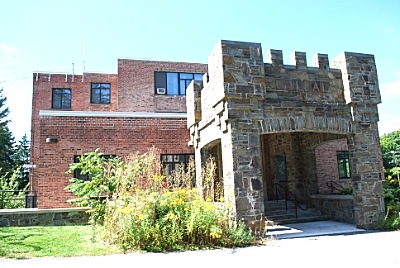- By Dan Veaner
- News
 Print
Print  A few weeks ago Lansing officials were among those who toured the Lansing Residential Center, the now closed juvenile detention center for girls. The property offers many opportunities for the Town, but would taking over the facility be a money pit? Would it be worth the trouble to administer? Real Estate Appraiser Michael Coles gave the Lansing Town Board a lot to think about Monday, outlining the pros and cons of acquiring the property.
A few weeks ago Lansing officials were among those who toured the Lansing Residential Center, the now closed juvenile detention center for girls. The property offers many opportunities for the Town, but would taking over the facility be a money pit? Would it be worth the trouble to administer? Real Estate Appraiser Michael Coles gave the Lansing Town Board a lot to think about Monday, outlining the pros and cons of acquiring the property."We can figure out what it's worth, but ideally you'd like to get it from the State for a dollar because they want to get rid of it. And you're a legal entity that could acquire it in that chain of people that are interested in it. At the same time you want to go into it with your eyes wide open as to how close you can get to breaking even, or, ideally, breaking even."
Coles is an accomplished real estate appraiser with experience in municipal properties. Last week he was hired by the Lansing School District for the second time to represent their interests in the new Cayuga Power Plant PILOT negotiations in which the value of the plant -- and therefore its impact on local taxes -- will be determined. School officials say Coles was invaluable in the last round of negotiations.

While it makes sense to break up the various facilities on the campus, New York State is selling the property as one parcel. There are several interested parties, including at least one local church and a school. The newly formed East Shore Arts Council has its eye on some of the facilities.
The Town Board has been considering additions to the Town Hall in the past few months because court operations have grown to the point where the volume of people coming for their day in court has begun interfering with other town functions. Storage for Lansing Recreation Department equipment is woefully inadequate.
If Lansing acquires the property whole departments could be moved out of the Town Hall, leaving room for the courts and increasing storage. It would provide more space for Recreation Department programs and activities, as well as for much needed storage.
It could also be a boon to community organizations such as the Lansing Community Council, Lion's and Rotary Clubs, and the new East Shore Arts Council, which has its eye on part of the facility for performance spaces, galleries, classrooms, practice rooms and studio space. The Town's historical records building is proving inadequate, and secure, climate controlled storage and display space could be moved to the girls school, eliminating the cost of replacing the existing building.

Coles said that possible uses include after school programs and other school uses, child care, senior housing, and churches, among others. He noted that not-for-profits are eligible for grants that would pay the rents to make the facility pay for itself.
he also recommended getting Senator Nozzolio and Assemblywoman Lifton on board with helping the Town acquire the property at the best possible terms, preferably for a dollar. While that may not happen, he said that the State's interest now is in unloading the property to get out from under maintenance expenses for a facility they are not using.
He pointed out that to build facilities at today's costs would be onerously more expensive than taking over an existing campus, but he warned that there are questions that will have to be answered. He said he had begun researching utility costs, and noted that the sewage system for the Girls school had been disconnected when the Boys school was constructed because the State preferred to run both schools on a sigle sewage treatment system. He said the sewage treatment facility on the Girls campus would have to be checked to see if it is stil operational. And he noted that such facilities rarely end up on the tax roles because they are such specialized facilitates that it would cost too much for private developers to convert to commercial uses.

He warned the board that they should find out what their immediate costs would be in taking over the facility, and what annual costs would be once it became operational, as well as the period during which it is converted for other uses.
Coles said the ideal would be to lease parts of the facility to not-for-profit organizations, aiming to break even with rents so the campus would not add costs to taxpayers. He said renting to for-profit businesses would put the Town in competition with the private sector, but added that some uses such as possible senior housing on the second floor of one of the buildings could augment income.
Coles also told the board that if they buy it they control what it is used for. Even if they sell parts of the property the Town would get to choose the buyers, insuring that part of town remains within desired uses.
"If you allow this to go up for auction you don't know who wants to buy it," he warned. "If you want to control it you've got to own it. If you ended up selling it you would at least control who bought it."
 This generator is capable of powering the whole campus in an emergencyColes said that he has been trying to convince the Lansing School District to buy generators that would make their buildings qualified as emergency shelters, but they have not shown interest in doing that. He said the Girls School already has all the elements of an emergency shelter, including a large generator that is engineered to restore power 9 seconds after an interruption, and he noted that emergency shelters qualify for grant funding.
This generator is capable of powering the whole campus in an emergencyColes said that he has been trying to convince the Lansing School District to buy generators that would make their buildings qualified as emergency shelters, but they have not shown interest in doing that. He said the Girls School already has all the elements of an emergency shelter, including a large generator that is engineered to restore power 9 seconds after an interruption, and he noted that emergency shelters qualify for grant funding."If you lose electric, where is everybody going to go?" he asked. "I am looking at it as a possible source of funding for the facility."
The Town of Lansing has recently been scrambling to come up with an emergency preparedness plan, after the Town was figuratively caught with its pants down during a recent storm that left some residents without power for three or four days. Highway Superintendent Jack French has noted that it has been dumb luck that Lansing hasn't been hit harder with all the recent storms in the area.
While taking over the property could provide countless benefits to the community, Coles was clear that the Town should do its homework before making a decision. That would mean putting the sale, which the State hopes will occur in November, on hold for long enough to get the facts.
"I would recommend three to six months," he said. "90 to 120 days at minimum. I don't think you can do it in less than 90 days. In that 90 days you are trying to identify who the not-for-profits are that would be interested, and what kind of grant funding could they get to pay for space?"
He recommended hiring an engineering firm to analyze everything and come up with dollar figures. He noted that such reports take at least six weeks to compile. He said he is continuing to get numbers on the real costs of operating the facility, from electric and gas costs to mowing the considerable lawn. He stated that if the numbers don't add up to make the property financially self-sustaining the Town should pass on the opportunity.
But he advocated doing that homework is worth the effort because of the many benefits the property could bring.
"This is a specialty property," Coles said. "It is one of a kind. You sure as heck don't want to build it, and the opportunity to buy it will probably come once in a lifetime."
v10i36



